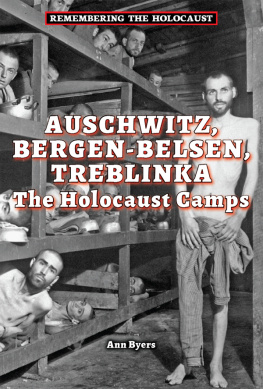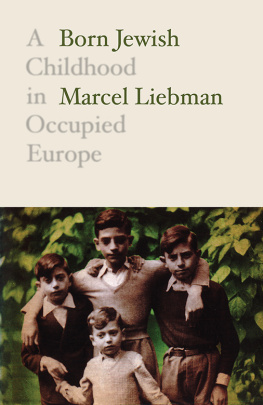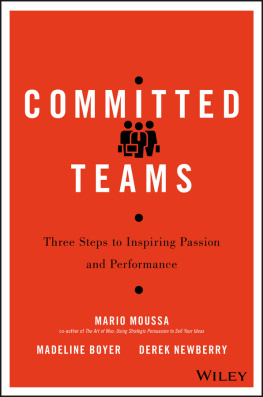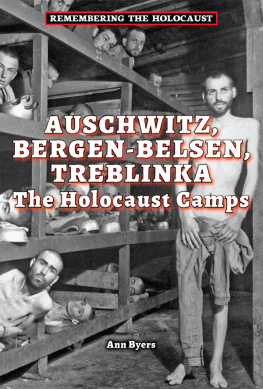The MARCEL NETWORK
Related Titles from Potomac Books
Doctor to the Resistance: The Heroic True Story of an
American Surgeon and His Family in Occupied Paris,
by Hal Vaughan
Harvest in the Snow: My Crusade to Rescue the
Lost Children of Bosnia, by Ellen Blackman
Needle in the Bone: How a Holocaust Survivor and a
Polish Resistance Fighter Beat the Odds and Found Each Other,
by Caryn Mirriam-Goldberg
Witness to Annihilation: Surviving the Holocaust,
by Samuel Drix
The MARCEL NETWORK
How One French Couple Saved 527 Children from the Holocaust
Fred Coleman

Copyright 2013 by Fred Coleman
Published in the United States by Potomac Books, Inc. All rights reserved. No part of this book may be reproduced in any manner whatsoever without written permission from the publisher, except in the case of brief quotations embodied in critical articles and reviews.
Library of Congress Cataloging-in-Publication Data
Coleman, Fred.
The Marcel network : how one French couple saved 527 children from the Holocaust / Fred Coleman. 1st ed.
p. cm.
Includes bibliographical references.
ISBN 978-1-61234-511-6 (hardcover : alk. paper)
ISBN 978-1-61234-512-3 (electronic)
1. Abadi, Moussa. 2. Abadi, Odette, 1914. 3. JewsFranceNiceBiography. 4. Jewish children in the HolocaustFranceNice. 5. World War, 19391945Children. 6. World War, 19391945JewsRescueFranceNice. 7. Holocaust, Jewish (19391945)FranceNice. 8. Nice (France)Ethnic relations. I. Title.
DS135.F9A334 2013
940.5318092244941dc23
2012031568
Printed in the United States of America on acid-free paper that meets the American National Standards Institute Z39-48 Standard.
Potomac Books
22841 Quicksilver Drive
Dulles, Virginia 20166
First Edition
10 9 8 7 6 5 4 3 2 1
To my children, Eric and Cynthia,
born, thank God, into a better world

Adapted from Eric Gaba and Rama, Occupation zones of France during the Second World War, courtesy of Wikimedia Commons.
CONTENTS
1
CHILDREN
Julien Engel saw his parents for the last time when he was barely nine years old. They stood on one side of a barbed-wire fence. Julien and his little brother, George, then not yet four, stood on the other. It was September 1942, during the German occupation of France in World War II. Their parents, David and Rosa Engel, had been arrested because they were Jews, and detained at an internment camp in the southwest. Soon they would be deported to the gas chambers at Auschwitz. Their small sons understood none of this. The boys had been arrested with their parents, housed in separate barracks inside the camp, and then brought out along the fence to say good-bye. Unlike their parents, the children would be spared. It was one of the last times anywhere in occupied France that Jewish children were released.
Julien and George could not hug or kiss their parents good-bye. They managed only to touch hands through the narrow slits between rows of barbed wire. Along the fence other families also made their farewells, with tears and wails. The last words Julien heard his parents say were Take care of your little brother.
After the Nazis arrested her parents, Marthe Artsztein hid with neighbors, the Weiss family, on the ground floor of her building. Monsieur and Madame Weiss gave Marthe her own bedroom at the back of the apartment. Their two daughters played with her and made her feel like a member of the family. One morning, Marthe awoke to find everyone else gone. The Gestapo had raided during the night and arrested the Weisses. They never looked for Marthe in the room at the back because her name was not on their list of people living in the apartment. Frightened and not knowing what to do, Marthe somehow understood that she had to hide somewhere else. She climbed out of her ground-floor window and down onto the Paris streets, where German soldiers and French police ruthlessly rounded up Jews, children included, and deported them to the death camps. Now Marthes survival depended on herself alone. She was eight years old.
Franoise Knopf and her family trembled in the rundown hotel for Jewish refugees in Nice. They heard boots on the stairs and German voices. Her mother made Franoise, fifteen, and her younger sister, eleven-year-old Paulette, hide in the closet. No matter what happens, dont say a word, she told the girls. The parents then opened their hotel room door partway, sat on the bed, and waited to be arrested, hoping that if they offered no resistance the Germans wouldnt look in the closet. The Knopfs heard more boots, this time in the hall on their floor. But no one ever entered their room. Every family in the hotel was arrested except theirs. The Germans took the partly opened door to mean that the room had already been searched and that no one was left inside.
The Knopfs left the hotel, but their ordeal was far from over. They had no place to stay. They had no ration cards to buy food legally, and with their money running out, they could no longer cope with black market prices. Worst of all, they knew they could not continue to provide for their daughters. In the most difficult decision for any parents, the Knopfs decided to give up their children to someone who was able to hide them safely, so at least their girls might live. They had the name of a couple who could help. It was their last chance.
He was a graduate studentshe, just out of medical school. Together, the young Jewish couple in German-occupied France had nothingno money, no influence, no protection. For Moussa Abadi, an immigrant from Syria, and Odette Rosenstock, his French companion, transport meant a borrowed bicycle, a meal was often only a hard-boiled egg, a shared cigarette was a luxury. And yet, improbably, these two stood up against Nazi atrocities. At the risk of their lives, they dedicated themselves to saving Jewish children from the gas chambers.
Moussa Abadi was only thirty-three and his future wife twenty-eight when they formed the Marcel Network to hide children in Catholic convents and boarding schools, or with Protestant families. Their clandestine network became one of the most successful operations of Jewish resistance anywhere in Europe, although, inevitably, not without tragic losses. The fate of hundreds of young people would ultimately depend on the Abadis, among them Julien and George Engel, Marthe Artsztein, and Franoise and Paulette Knopf.
The true story of the Marcel Network has been drawn from a multitude of sources, and is now told in full for the first time in this book. Moussa and Odette admitted that the odds were overwhelmingly stacked against them. And still, they persevered. Armed only with courage, brains, and a moral compass, they defied one of the most brutal dictatorships in history to save 527 young lives. As an example of what only two people of goodwill can accomplish when confronted with crimes against humanity, their story is a lesson for all time.
2
MOUSSA AND ODETTE
Moussa Abadi arrived in France on a graduate student scholarship in 1933, determined to stay forever. He loved the French language, culture, and, most of all, the theater. In Paris, at the Sorbonne, Moussa worked toward a doctorate in literature, with a thesis on French theater in the Middle Ages. He also trained to become an actor, winning a leading role in a French professional troupe that performed in New York for five months in 1937. The young Abadi was short and stocky, with a full round face, outsized glasses, dark hair, and a Mediterranean complexion. The actor in him made Moussa a dazzling storyteller, from his humble origins in the Jewish ghetto of Damascus, to his glory days on the American stage.
Next page









